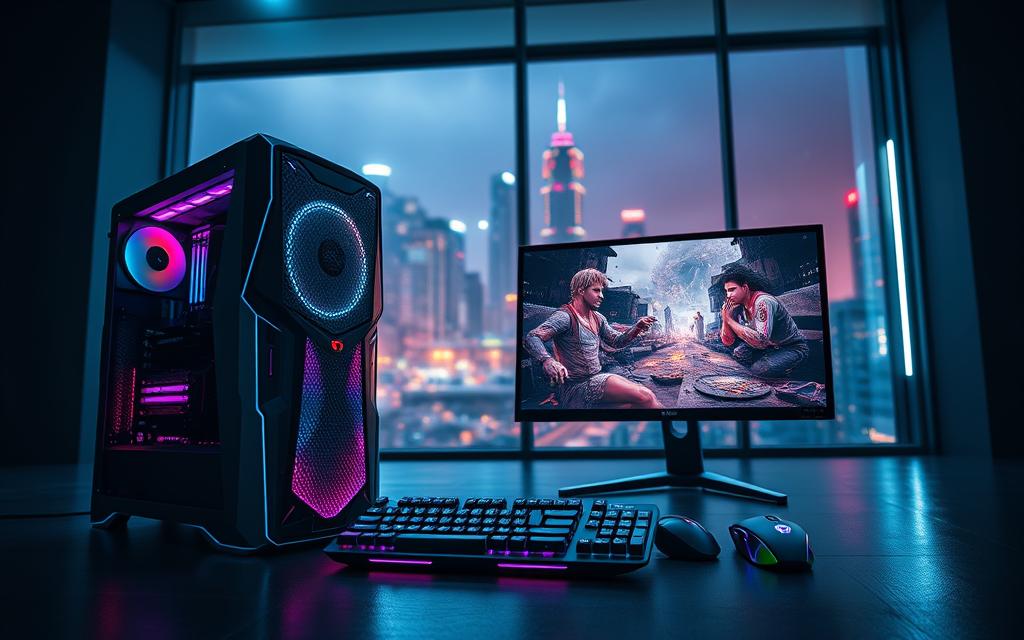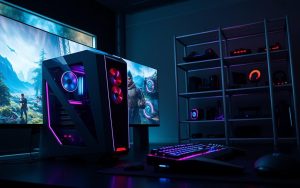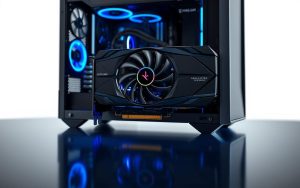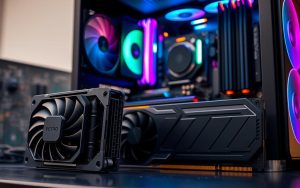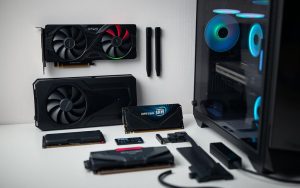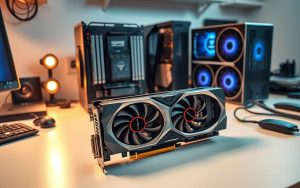Table of Contents
Building a high-performance gaming PC in 2025 requires careful planning. With new titles demanding more power, balancing hardware components is essential. Synergy between the CPU, GPU, and RAM ensures smooth gameplay and future-proofing.
Cost plays a significant role, with options ranging from budget-friendly builds under $500 to enthusiast setups exceeding $4,000. Each tier offers distinct performance levels, catering to different gaming needs.
Emerging trends like DDR5 memory and PCIe 5.0 interfaces are shaping the future of gaming pcs. These advancements enhance speed and efficiency, making them crucial for next-gen gaming. Understanding these elements helps create a system that excels in both current and upcoming titles.
Introduction to Gaming PCs in 2025
Gaming PCs in 2025 are redefining performance standards. With games demanding higher resolutions and smoother frame rates, components like GPUs and CPUs are evolving rapidly. The shift from 1080p to 4K and even 8K gaming has transformed hardware requirements.
Major brands like MSI, HYPERPC, and Skytech lead the prebuilt market. Their systems are designed to handle 4K/144Hz+ performance and advanced ray tracing. These features ensure immersive visuals and seamless gameplay.
Hybrid gaming and streaming setups are becoming more common. Gamers now need multitasking power to run games while broadcasting in high quality. VR and AR technologies also push hardware limits, requiring robust components for smooth experiences.
High-end builds now standardize liquid cooling for better thermal management. Additionally, RGB ecosystem integration has grown in importance, adding both style and functionality to modern gaming pcs.
Why Future-Proofing Your Gaming PC is Essential
Modern games evolve fast—your hardware shouldn’t lag behind. AAA titles like Cyberpunk 2077 Phantom Liberty now demand 16–32GB RAM and 8-core CPUs. GPUs need 50% more VRAM yearly to handle 4K textures and ray tracing.
Hardware obsolescence hits every 3–5 years. A mid-tier GPU today may struggle with 2027 releases. Incremental upgrades cost less than full rebuilds. For example:
| Strategy | Cost (5 Years) | Performance |
|---|---|---|
| Full rebuild | $3,000+ | Peak, but expensive |
| Upgrades (GPU, RAM) | $1,200 | High, with flexibility |
PCIe 5.0 and DisplayPort 2.1 are critical. They support next-gen SSDs and 8K monitors. Leaked GTA VI specs suggest 24GB VRAM minimum—current mid-range cards cap at 12GB.
Modular power supplies and spacious chassis simplify upgrades. HYPERPC’s 2025 builds use tool-less designs for quick swaps. Plan ahead to avoid bottlenecks.
What is the Best Specs for a Gaming PC in 2025?
The gaming landscape in 2025 pushes hardware to its limits. With titles becoming more demanding, choosing the right components is crucial. A balanced setup ensures smooth gameplay and longevity.
For minimum requirements, consider an RTX 4060 or RX 7600 GPU paired with a Core i5-14400F CPU and 16GB DDR5 RAM. This configuration handles 1080p gaming efficiently. However, for 4K/120Hz performance, upgrades are necessary.
Recommended setups include the RTX 4070 Ti Super or RX 7900 XTX GPUs, a Core i7-14700K CPU, and 32GB DDR5 RAM. These specs deliver exceptional ray tracing and DLSS 3.5 capabilities, enhancing visual fidelity.
Storage is another critical factor. Modern games often exceed 200GB, making 1TB NVMe SSDs a must. For multi-GPU setups, calculate power supply wattage carefully. A 850W PSU is ideal for high-end configurations.
“Future-proofing your system requires attention to BIOS/UEFI features. These enable hardware longevity and compatibility with emerging technologies.”
| Component | Minimum | Recommended |
|---|---|---|
| GPU | RTX 4060 / RX 7600 | RTX 4070 Ti Super / RX 7900 XTX |
| CPU | Core i5-14400F | Core i7-14700K |
| RAM | 16GB DDR5 | 32GB DDR5 |
Investing in these components ensures your system remains competitive. Whether you’re building from scratch or upgrading, these specs provide a solid foundation for next-gen gaming.
Choosing the Right Processor (CPU) for Gaming
Your CPU choice directly impacts gaming performance and system longevity. Modern games demand powerful processors to handle complex calculations and high frame rates. Whether you prefer Intel Core or AMD Ryzen, understanding their strengths ensures a balanced build.
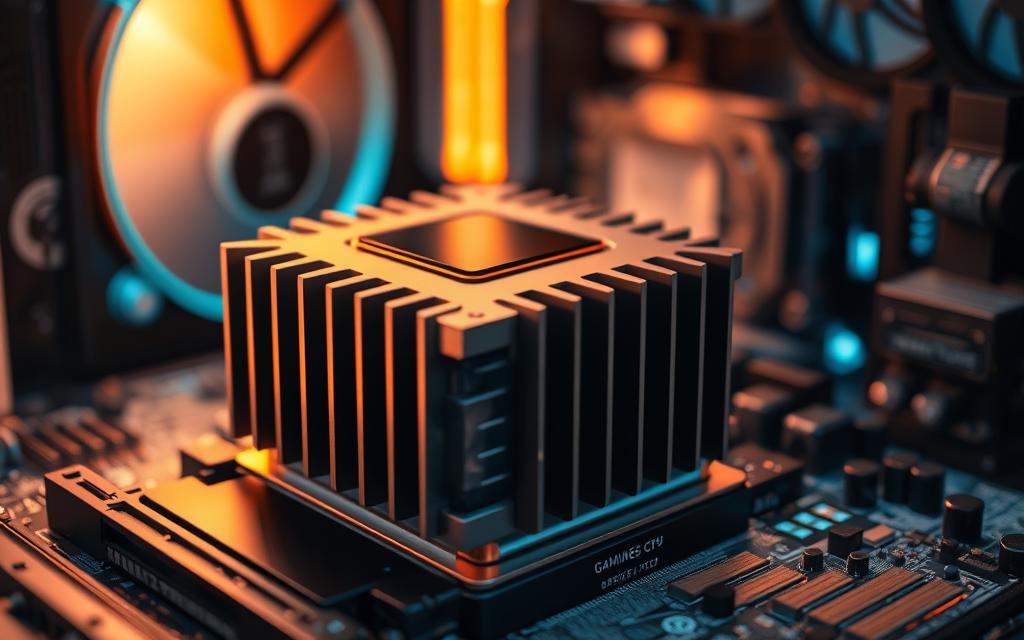
Intel vs. AMD: Which is Better for Gaming?
Intel’s 14th-gen Raptor Lake Refresh and AMD’s Ryzen 7000/9000 series dominate the market. Intel excels in single-core performance, ideal for older games optimized for fewer cores. AMD, with its 3D V-Cache technology, shines in multi-core tasks and modern engines.
Benchmarks show the Intel Core i9-14900K outperforms the AMD Ryzen 7 7800X3D in raw speed. However, AMD’s efficiency and lower thermal design power (TDP) make it a compelling choice for energy-conscious gamers.
Core Count and Performance: What You Need to Know
AAA titles now require at least 6 cores for smooth gameplay. More cores improve multitasking, such as streaming while gaming. Intel’s high clock speeds and AMD’s advanced cache systems cater to different needs.
- Single-core optimization benefits older games.
- Multi-core setups handle modern engines and multitasking.
- Overclocking headroom varies between Z790 and X670 chipsets.
Future-Proofing Your CPU Choice
Investing in a processor with room for upgrades is essential. Intel’s LGA 1700 and AMD’s AM5 sockets offer long-term compatibility. Consider thermal management and power efficiency to avoid bottlenecks in future titles.
Leaked specs for upcoming games suggest higher core and cache requirements. Choosing a CPU with ample headroom ensures your system remains competitive for years.
Graphics Card (GPU) Selection for Optimal Performance
Next-gen titles demand powerful GPUs to handle advanced visual effects. Modern graphics cards must deliver ray tracing, AI upscaling, and high frame rates simultaneously. Choosing between GeForce RTX and AMD Radeon models depends on your resolution and budget.
NVIDIA vs. AMD: Which Performs Better?
NVIDIA’s GeForce RTX 40-series leads in ray tracing performance. The RTX 4090 achieves 98 fps in Cyberpunk 2077 at 4K Ultra settings. DLSS 3.5 frame generation provides smoother gameplay with less power draw.
AMD counters with better price-to-performance ratios. The RX 7900 XTX matches NVIDIA’s output in rasterization while costing 20% less. FSR 3 technology closes the gap in upscaling quality.
VRAM Requirements for Modern Gaming
4K textures now require 16GB VRAM minimum. Games like Avatar: Frontiers of Pandora consume 14-18GB at maximum settings. Future-proof your build with cards featuring:
- GDDR6X/GDDR7 memory
- 384-bit+ memory interfaces
- 600+ GB/s bandwidth
Choosing the Right GPU Tier
Budget constraints dictate which graphics card fits your needs. Consider these 2025 recommendations:
| Tier | NVIDIA | AMD | Performance |
|---|---|---|---|
| Budget | RTX 4060 | RX 7600 | 1080p/60fps |
| Mid-Range | RTX 4070 | RX 7800 XT | 1440p/120fps |
| High-End | RTX 4090 | RX 7900 XTX | 4K/144Hz+ |
Small form factor builds need compact graphics cards with efficient cooling. Always verify case clearance before purchasing. Professional tools like MSI Afterburner help optimize clock speeds and fan curves.
RAM: How Much Memory Do You Really Need?
RAM plays a pivotal role in ensuring smooth gaming experiences, especially as titles become more demanding. Modern games like Hogwarts Legacy and Forspoken require at least 32GB of memory for optimal performance. Balancing capacity, speed, and latency is key to building a future-proof system.
DDR4 vs. DDR5: Which is Better for Gaming?
DDR5 ram has become the standard for high-end builds, offering faster speeds and better efficiency. Compared to DDR4, DDR5-6000 CL30 provides a significant boost in bandwidth, ideal for Intel and AMD platforms. However, DDR4 remains a cost-effective option for budget-conscious gamers.
Latency and bandwidth tradeoffs are crucial. While DDR5 excels in raw speed, DDR4 often has lower latency, making it suitable for older titles. XMP and EXPO profiles simplify overclocking, ensuring your memory runs at peak performance.
Optimal RAM Capacity for Future-Proofing
For most gamers, 32GB of ddr5 ram strikes the perfect balance between cost and capability. This capacity handles multitasking, such as streaming or running background applications, without compromising gameplay. Quad-channel configurations further enhance performance, though dual-channel setups remain the norm.
Error correction (ECC) is another consideration, especially for streaming setups. While not essential for casual gamers, ECC ensures stability during long sessions. RGB lighting, while aesthetic, can impact thermals, so choose wisely.
Memory Speed and Its Impact on Gaming Performance
Faster memory speeds directly translate to smoother gameplay. DDR5-6000 CL30 is the sweet spot for most builds, offering a balance of speed and latency. Higher speeds benefit CPU-intensive tasks, while lower latency improves responsiveness.
When configuring your system, prioritize compatibility with your motherboard and CPU. Overclocking can push ddr5 ram to its limits, but ensure proper cooling to avoid instability. Investing in quality memory ensures your system remains competitive for years.
Storage Solutions for Gamers
Choosing the right storage solution is critical for modern gaming setups. With games growing in size and complexity, your system’s storage must keep up. Whether you’re building a new PC or upgrading, understanding the options ensures smooth gameplay and quick load times.
SSD vs. HDD: Which is Best for Gaming?
Solid-state drives (SSDs) have become the standard for gaming due to their speed and reliability. Unlike traditional hard drives (HDDs), SSDs offer faster load times and better performance in open-world games. HDDs, while cheaper, struggle with modern titles that demand quick data access.
For budget builds, pairing a smaller SSD with a larger HDD for bulk storage is a practical solution. However, for high-end systems, all-SSD configurations are recommended to maximize performance.
NVMe SSDs: The Future of Gaming Storage
NVMe SSDs represent the next leap in storage technology. With PCIe 4.0 and 5.0 interfaces, these drives deliver unparalleled speeds, reducing load times by up to 40% with technologies like DirectStorage API.
“DirectStorage API reduces load times by 40%, making NVMe SSDs essential for next-gen gaming.”
Heat management is crucial for Gen5 NVMe drives, as they generate more heat under heavy loads. Enthusiasts often use RAID 0 configurations to further boost performance, though this requires careful planning and cooling.
How Much Storage Do You Need for Modern Games?
Modern AAA titles often exceed 200GB, making a 2TB storage drive a minimum recommendation. For gamers with extensive libraries, external SSDs offer additional space and flexibility, especially for console crossplay setups.
- PCIe 4.0 vs. 5.0: Gen5 drives offer double the throughput but require better cooling.
- SLC caching: Enhances endurance and performance for frequent writes.
- External SSDs: Ideal for portable gaming and cross-platform compatibility.
Investing in quality storage ensures your system remains competitive, whether you’re gaming at 1080p or 4K.
Power Supply (PSU) Considerations
A reliable power supply is the backbone of any high-performance gaming system. It ensures stable energy delivery to all components, preventing crashes and hardware damage. Choosing the right PSU involves balancing wattage, efficiency, and future-proofing.
Wattage and Efficiency: What to Look For
High-end gaming builds demand significant power. For systems with RTX 40-series GPUs, a minimum of 1000W is recommended. The ATX 3.0 standard ensures compatibility with next-gen hardware, providing better energy distribution and safety.
Efficiency ratings like 80 Plus Titanium indicate how well a PSU converts AC to DC power. Higher efficiency reduces energy waste and lowers electricity bills. Always verify wattage requirements based on your system’s components to avoid underpowering.
Modular vs. Non-Modular PSUs
Modular PSUs offer flexibility by allowing users to connect only the cables they need. This improves airflow and simplifies cable management, enhancing system cooling. Non-modular units are more budget-friendly but can lead to cluttered builds.
Multi-rail designs provide better load balancing, while single-rail setups are simpler to configure. Inrush current protection safeguards against power surges, ensuring long-term reliability.
Future-Proofing Your Power Supply
Investing in a high-quality PSU ensures compatibility with future upgrades. Look for units with extended warranties, as they often indicate superior build quality. Features like PCIe 5.0 support and advanced cooling solutions add value over time.
“A well-chosen PSU not only powers your system today but also prepares it for tomorrow’s demands.”
By prioritizing efficiency, modularity, and future-proofing, you can build a gaming rig that performs reliably for years.
Motherboard: The Backbone of Your Gaming PC
A motherboard acts as the foundation, connecting all critical components in your gaming rig. It determines compatibility, performance, and future upgrade potential. Choosing the right one ensures your system runs smoothly and remains competitive.
Choosing the Right Chipset for Your CPU
Modern chipsets like Z790 and X670 enable advanced features such as CPU overclocking. These platforms support amd ryzen and Intel processors, offering flexibility for high-performance builds. PCIe 5.0 x16 slots ensure compatibility with next-gen GPUs, maximizing bandwidth for demanding games.
VRM phase design is another critical factor. High-quality VRMs provide stable power delivery, essential for overclocking and sustained performance. Look for motherboards with robust cooling solutions to handle intense workloads.
Form Factors: ATX, Micro-ATX, and Mini-ITX
Motherboards come in various sizes, each suited for different builds. ATX boards offer ample expansion slots and connectivity, ideal for high-end systems. Micro-ATX strikes a balance between size and features, while Mini-ITX is perfect for compact builds.
Thunderbolt 4 and USB4 integration provide lightning-fast data transfer speeds. These features are essential for gamers using external storage or high-resolution displays. Wi-Fi 7 and Ethernet 10Gbe ensure lag-free online gaming and streaming.
Future-Proofing Your Motherboard Choice
Investing in a motherboard with BIOS flashback features simplifies updates and compatibility checks. POST code displays help troubleshoot issues quickly, saving time during setup. These features ensure your system remains adaptable to future technologies.
“A well-chosen motherboard not only powers your system today but also prepares it for tomorrow’s demands.”
By prioritizing features like PCIe 5.0, advanced cooling, and modular design, you can build a gaming rig that stands the test of time. Whether you’re upgrading or starting from scratch, the right motherboard ensures peak performance and longevity.
Cooling Solutions for High-Performance Gaming
Efficient cooling is vital for maintaining peak gaming performance. As components like CPUs and GPUs push their limits, proper thermal management ensures stability and longevity. Whether you choose air or liquid cooling, understanding the options helps build a reliable system.
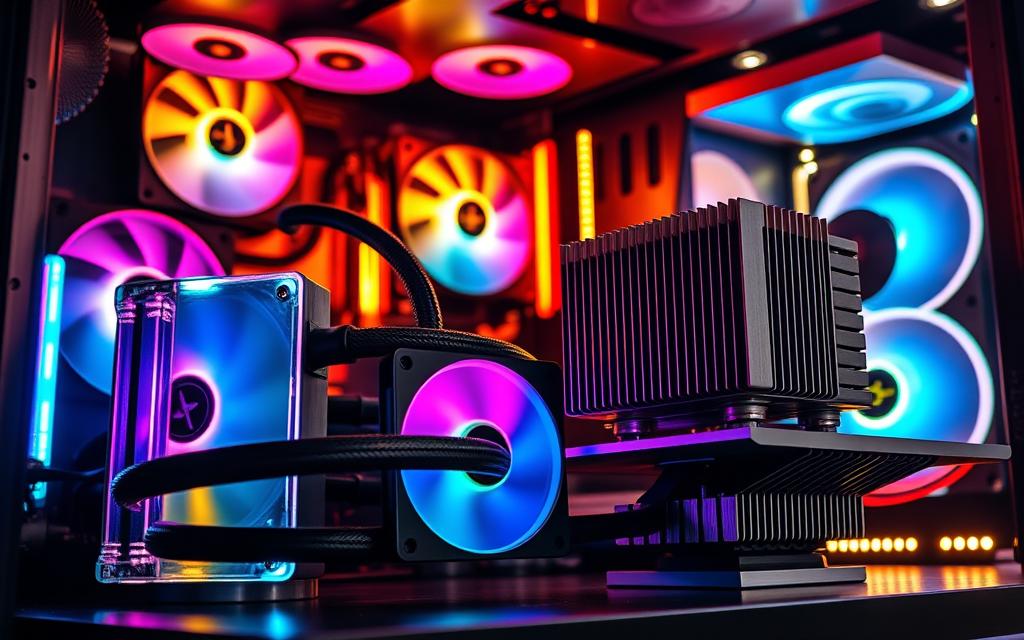
Air Cooling vs. Liquid Cooling: Which is Better?
Air cooling remains a popular choice for its simplicity and cost-effectiveness. High-quality heatsinks and fans can handle most mid-range builds efficiently. However, for high-end systems, liquid cooling offers superior thermal management. AIO (All-In-One) coolers, like the 280mm models from HYPERPC, are ideal for i9 and Ryzen 9 CPUs.
Custom loops provide even better cooling potential but require more maintenance. Pump noise and thermal interface materials also play a role in choosing the right solution. Liquid cooling systems move heat 30 times faster than air, making them essential for overclocking and high-performance setups.
Case Airflow and Its Impact on Cooling
Proper airflow is crucial for maintaining low temperatures. Negative pressure setups draw air out of the case, while positive pressure pushes air in. Both methods have their advantages, but dust filtration systems are essential to prevent buildup.
- Fan bearing types, like fluid dynamic or rifle, affect noise and durability.
- Dust filters improve longevity by keeping components clean.
- Optimal fan placement ensures efficient heat dissipation.
Future-Proofing Your Cooling System
Investing in a robust cooling solution ensures your system remains competitive. Advanced features like modular designs and RGB lighting add both functionality and style. Regular maintenance, such as cleaning radiators and replacing thermal paste, keeps your setup running smoothly.
“A well-designed cooling system not only enhances performance but also extends the life of your hardware.”
| Cooling Type | Pros | Cons |
|---|---|---|
| Air Cooling | Cost-effective, easy to install | Limited cooling capacity |
| Liquid Cooling | Superior thermal management | Higher cost, requires maintenance |
By choosing the right cooling solution, you can ensure your gaming rig stays cool and performs at its best for years to come.
PC Case: More Than Just Aesthetics
The PC case is often overlooked but plays a crucial role in system performance. It houses all your components, ensuring they work together seamlessly. Beyond looks, a good case enhances airflow, cable management, and upgradeability.
Choosing the Right Case for Your Build
Selecting the perfect case depends on your build’s needs. HYPERPC cases feature modular designs, making upgrades hassle-free. Ensure the case has at least 7 PCI slots for expansion cards. GPU length clearance is vital—up to 400mm for high-end cards.
- Vertical GPU mounting saves space but may affect cooling.
- Sound dampening materials reduce noise for quieter builds.
- Tool-less drive bay designs simplify installation and maintenance.
Airflow and Cable Management Considerations
Proper airflow keeps your components cool and extends their lifespan. Look for cases with mesh panels and multiple fan mounts. Cable management is equally important—tidy cables improve airflow and make upgrades easier.
Front panel I/O with USB 3.2 Gen 2×2 ports ensures fast data transfer. Consider cases with dust filters to keep your build clean and efficient.
Future-Proofing Your PC Case
Investing in a versatile case ensures compatibility with future upgrades. Modular designs allow for easy component swaps. A spacious interior accommodates larger GPUs and cooling solutions.
“A well-chosen PC case not only enhances performance today but also prepares your build for tomorrow’s demands.”
By prioritizing features like airflow, modularity, and expansion potential, you can create a system that stands the test of time.
Upgradeability: Planning for the Future
Future-proofing your gaming rig involves strategic planning for upgrades. As technology evolves, ensuring your system can adapt is crucial. AM5 and LGA 1851 sockets, guaranteed through 2026, provide a solid foundation for future components.
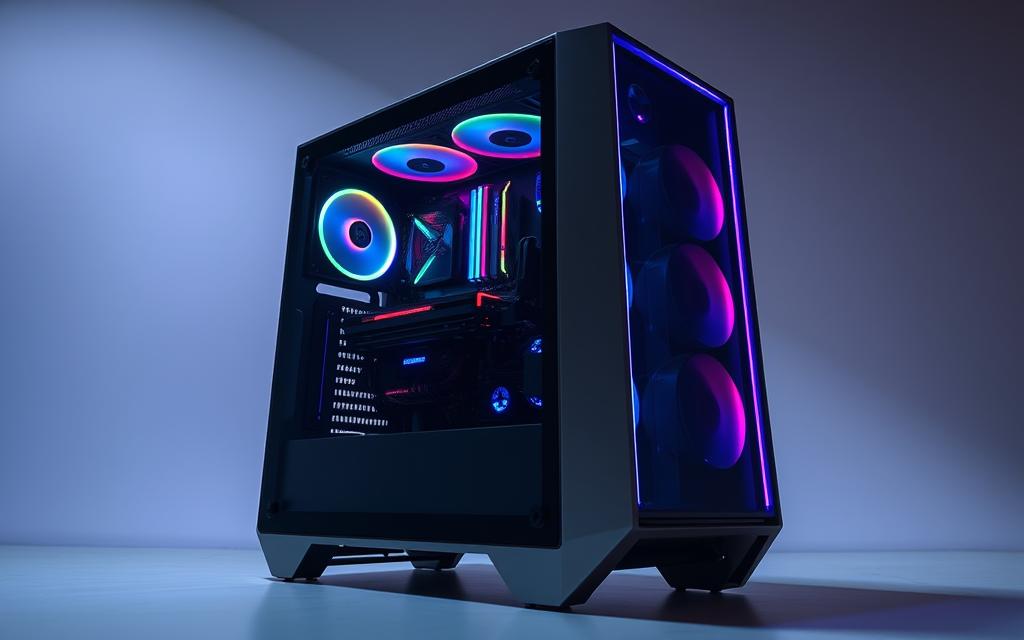
Resizable BAR support is another feature to consider. It increases FPS by 12%, enhancing performance in demanding titles. This technology allows your GPU to access the entire VRAM, improving efficiency and frame rates.
Component replacement timelines are essential to plan. CPUs and GPUs typically need updates every 3-5 years. Firmware updates also play a role, ensuring compatibility with new hardware and features.
Identifying bottlenecks early helps prioritize upgrades. Tools like MSI Afterburner and HWMonitor provide insights into system performance. Addressing these issues prevents unnecessary spending on non-critical components.
Secondary market value retention is another factor. High-quality parts retain their value longer, making resale easier. Warranty transfer considerations also matter, as some manufacturers allow warranties to carry over to new owners.
“A well-planned upgrade strategy ensures your system remains competitive for years to come.”
By focusing on these aspects, you can build a gaming rig that adapts to future demands. Whether it’s new GPUs or faster RAM, a forward-thinking approach keeps your setup relevant and powerful.
Balancing Performance and Budget
Finding the right balance between cost and power is key to building a gaming PC. Whether you’re aiming for a budget-friendly setup or a high-end rig, understanding the price-to-performance ratio ensures you get the most value for your money.
For example, the MXZ Gaming PC with an RX 7600 GPU is priced at $879, offering solid performance for 1080p gaming. On the other hand, the Skytech Eclipse RTX 4090 build costs $3,400, delivering unmatched power for 4K gaming and ray tracing. These examples highlight the importance of aligning your budget with your gaming needs.
When building or upgrading, consider the risks of used components. While they may save you money upfront, they often lack warranties and can fail unexpectedly. New parts, though more expensive, provide reliability and long-term support.
Regional pricing variations also play a role. Components may cost more in certain areas due to taxes, shipping, or availability. Researching local deals and international options can help you stay within budget.
Bundle deals, such as CPU and motherboard combos, are another way to save. These packages often offer discounts, making them a smart choice for cost-conscious gamers. Additionally, consider the impact of cryptocurrency mining on GPU availability and prices. Mining demand can drive up costs, so timing your purchase is crucial.
“A well-planned budget ensures you get the most out of your gaming setup without overspending.”
By carefully analyzing your needs and exploring all options, you can build a gaming PC that delivers exceptional performance without breaking the bank. Whether you’re a casual gamer or a hardcore enthusiast, balancing cost and power is the key to success.
Prebuilt vs. Custom Gaming PCs: Which is Better?
Deciding between prebuilt and custom gaming pcs can shape your gaming journey. Both options offer unique benefits, but understanding their differences ensures you make the right choice for your needs.
Prebuilt systems, like those from HYPERPC, come with customizable options and 3-year warranties. These setups are ideal for gamers who want convenience and reliability. On the other hand, DIY builds can save 15-20% on average, offering more control over components and cost.
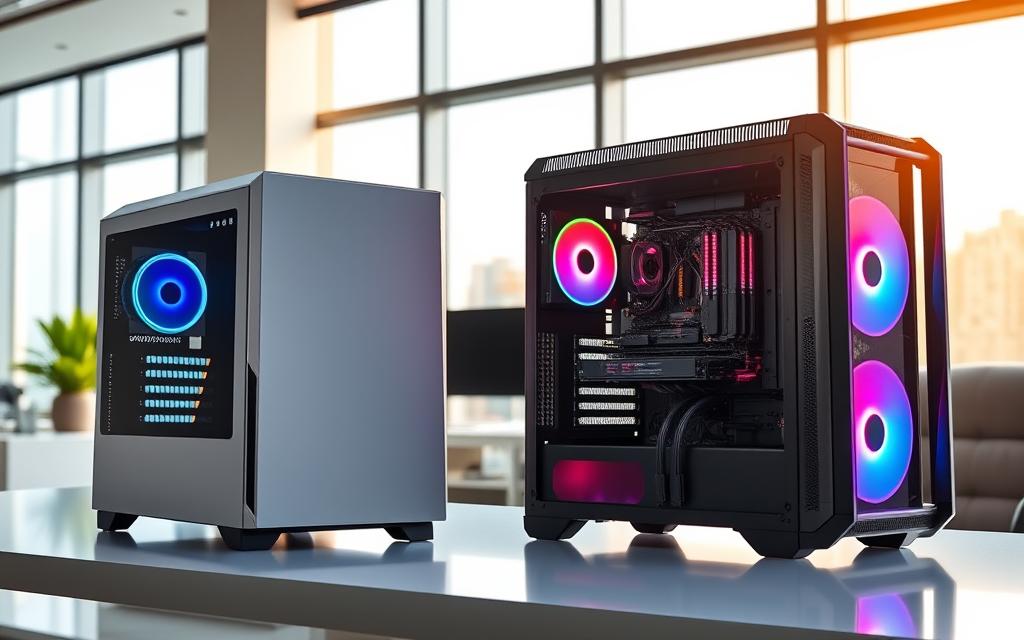
Warranty and service plans are key factors to consider. Prebuilt PCs often include comprehensive support, while DIY builds rely on individual component warranties. OEM bloatware can also affect prebuilt systems, potentially slowing down performance.
Cable management quality varies between prebuilt and custom setups. DIY builds allow for meticulous organization, improving airflow and aesthetics. Prebuilt gaming pcs may have less flexibility in this area.
Component binning practices differ as well. Prebuilt manufacturers often use mid-tier parts to balance cost and performance. Custom builds let you choose high-end components for a superior experience.
Stress testing is another consideration. Prebuilt systems undergo rigorous testing before shipping, ensuring stability. DIY builds require manual testing, which can be time-consuming but rewarding.
“The right choice depends on your priorities—convenience or customization.”
| Aspect | Prebuilt PCs | Custom PCs |
|---|---|---|
| Cost | Higher upfront | 15-20% savings |
| Warranty | 3-year coverage | Component-based |
| Customization | Limited options | Full control |
| Performance | Mid-tier parts | High-end components |
By weighing these factors, you can choose the option that best suits your gaming needs. Whether you prioritize convenience or customization, both prebuilt and custom gaming pcs offer a rewarding experience.
Conclusion
Building a competitive gaming rig in 2025 demands attention to detail. With DDR5 and PCIe 5.0 becoming the baseline, ensuring your system meets these standards is crucial. HYPERPC exemplifies balanced configurations, offering performance and reliability for demanding titles.
Critical thresholds include a powerful CPU like the Intel Core i9-14900K and a GPU such as the NVIDIA RTX 4080 Super. Pair these with 32GB DDR5 RAM and a PCIe 4.0 SSD for optimal results. Emerging technologies like optical PCIe are worth monitoring for future upgrades.
Balancing cost and performance is key. Explore community resources and manufacturer support channels for build validation. For more insights, check out HYPERPC’s guide on components and configurations.
Future-proofing your setup ensures it remains relevant. Focus on modular designs and upgradeable components to adapt to evolving gaming demands. With careful planning, your rig will deliver exceptional gaming experiences for years to come.
FAQ
Which processor is better for gaming in 2025, Intel Core or AMD Ryzen?
Both Intel Core and AMD Ryzen offer excellent gaming performance. Intel excels in single-core tasks, while AMD provides more cores at a competitive price. Choose based on your budget and specific gaming needs.
How much RAM is needed for modern games in 2025?
For smooth gaming performance, 16GB of DDR5 RAM is the sweet spot. However, 32GB is recommended for future-proofing and handling more demanding applications.
Should I choose an NVIDIA GeForce RTX 4070 or AMD Radeon GPU?
The NVIDIA GeForce RTX 4070 offers advanced ray tracing and DLSS support, while AMD Radeon GPUs provide great value for performance. Consider your gaming resolution and budget when deciding.
Is an SSD necessary for gaming, or can I use an HDD?
An NVMe SSD is highly recommended for faster load times and smoother gameplay. While HDDs are cheaper, they significantly slow down performance in modern games.
What wattage should my power supply have for a high-end gaming PC?
For a high-end system with components like the RTX 4090, a 750W to 850W power supply is ideal. Ensure it’s 80+ certified for efficiency and reliability.
How important is the motherboard in a gaming PC build?
The motherboard is crucial as it connects all components. Choose one with the right chipset for your CPU, sufficient PCIe slots, and support for future upgrades like DDR5 RAM.
Should I go for air cooling or liquid cooling for my gaming PC?
Air cooling is cost-effective and reliable, while liquid cooling offers better thermal performance for overclocked systems. Decide based on your CPU’s heat output and case airflow.
Is it better to buy a prebuilt gaming PC or build a custom one?
Building a custom PC allows for tailored performance and upgradeability, while prebuilt systems offer convenience and warranty support. Choose based on your technical expertise and preferences.


